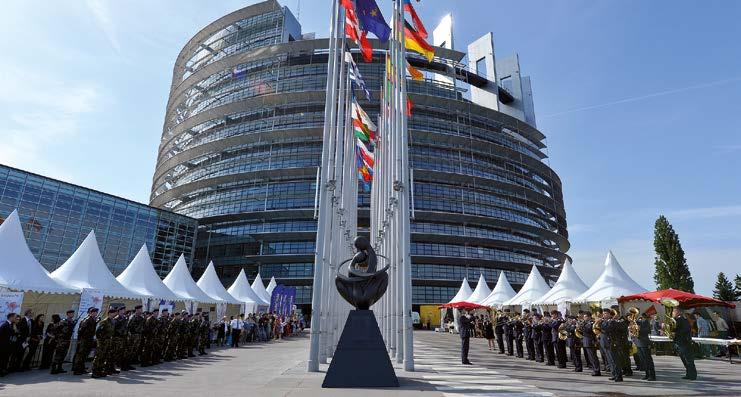Making sense of the EU initiatives on defence The progressive framing of a common Union defence policy takes place now
by Michael Gahler MEP, Spokesperson on Security and Defence of the EPP Group, European Parliament, Brussels/Strasbourg
I
n recent months, EU institutions have experienced a Copernican revolution, organising EU support for defence together. Both external and domestic factors triggered this development.
Time to implement a political vision Russia’s violent activities in Ukraine and Syria, fragile or failed states in the Middle East and Africa harbouring terrorists, and organised crime structures are threatening the security of EU citizens. In addition, the current US administration’s repeated calls on Europeans to spend more on security has led to increased defence spending but not necessarily better spending. However, spending the taxpayer’s money better is a necessity. Governments have to cooperate more to make better use of the overall amount of national defence budgets. That is around 210 billion each year. To achieve this goal, it makes sense to
photo: © European Parliament
THE EUROPEAN – SECURITY AND DEFENCE UNION
use EU procedures and the common budget as an incentive for more, better cooperative programmes and multilateral forces. On the domestic front, the provisions regarding defence in the Lisbon Treaty are the key to better understand the current initiatives. Going beyond the Common Security and Defence Policy (CSDP), EU observers have witnessed, for a couple of months now, intensified efforts to activate those provisions. As outlined in the EU Treaty, ‘the progressive framing of a common Union defence policy’ takes place now, which will lead to the establishment of ‘common defence’ (article 42.2 TEU). In the end, it is up to the Member States to organise ‘common defence’ within a European Defence Union covering both operations abroad and mutual defence. In pursuing this goal, Member States implement a political vision that European Parliamentarians have developed since the entry into force of the Lisbon Treaty in 2009.
Intergovernmental and supranational interaction
Indeed, the provisions of the Lisbon Treaty have the chance to improve our common defence. If implemented in a spirit of European integration, the European Defence Agency, as intergovernmental actor, can serve as Europe’s military planning agency. In this ambitious role, the agency serves as the preferred partner for aligning common defence planning with a meaningful Coordinated Annual Review on Defence (CARD). Once Member States have a better Michael Gahler MEP common vision of current capabilities and future needs, has been a Member of the European Parliament they can translate those elements via the European since April 1999. Born in 1960 in Frankfurt/Main, Capability Mechanism into the Capability Development he is currently a member of the Foreign Affairs Plan (CDP). With the CDP, Member States can review Committee, serves as the EPP Group Coordinator in input from different European sources in order to agree the Subcommittee on Security and Defence, and is on common priorities for capability development. Later a substitute member of the Transport and Tourism Photo: private on, the CDP can assist as the central point of orientaCommittee. tion for research and development (R&D) efforts at EU level.
48

















